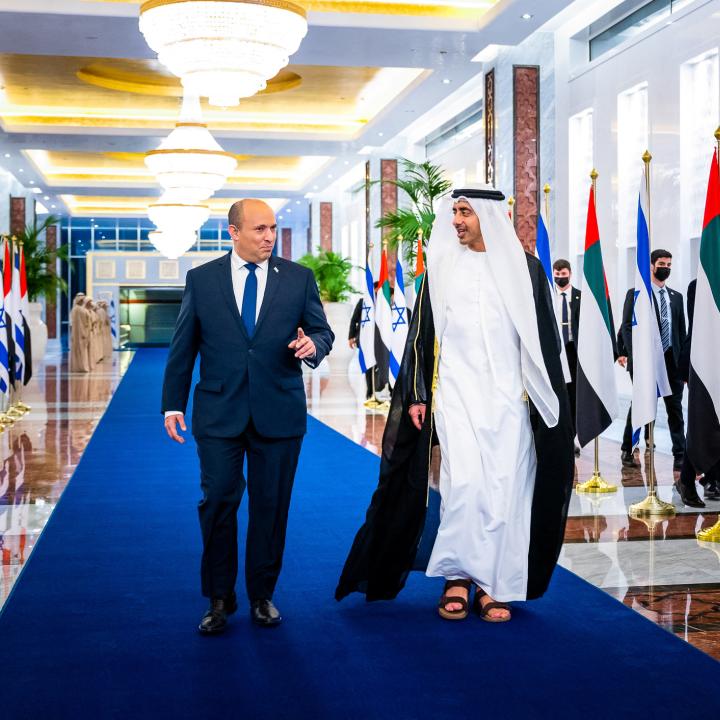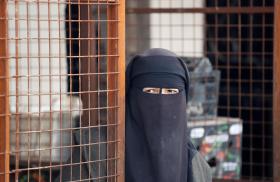
- Policy Analysis
- PolicyWatch 3611
Building an Arab-Israel Bloc: Can It Compensate for a Reluctant Washington?

Arab, European, and Israeli experts assess the possibilities and limits of normalization, discussing concerns about Iran’s nuclear program, U.S. retrenchment, and the Palestinian issue.
On May 10, The Washington Institute held a virtual Policy Forum with Nickolay Mladenov, Zohar Palti, Ebtesam al-Ketbi, and Karim Haggag. Mladenov is the Institute’s Segal Distinguished Visiting Fellow and former UN special coordinator for the Middle East peace process. Palti recently served as head of the Political-Military Bureau in Israel’s Ministry of Defense. Ketbi is founder and president of the Emirates Policy Center. Haggag served for twenty-five years in Egypt’s diplomatic corps and is currently a fellow with the Harvard Kennedy School’s Middle East Initiative. The following is a rapporteur’s summary of their remarks.
Nickolay Mladenov
The Abraham Accords are extremely important, and two critical aspects deserve more attention. From Israel’s perspective, the Arab world is sending a message of acceptance and recognition that Jews and Israel are part of the region’s past, present, and future. And from the Arab perspective, the key takeaway is tolerance and understanding between the Abrahamic faiths.
Although the accords could survive without the United States, Washington should not move away from the Middle East. America plays a key military role in the region, and its leadership and direction are critical as well. Enormous opportunities have emerged to extend these partnerships to other countries, as seen in the new four-way relationship between the United States, United Arab Emirates, Israel, and India.
Policymakers also have ample room to show that the accords represent an opportunity for Palestinians, not an obstacle. Egypt and Jordan are the key actors in this regard, with everyone else in a supporting role. There are rays of hope—projects like the Israel-Jordan solar-for-water swap funded by the UAE could significantly improve life for Palestinians.
Although the Israeli-Palestinian peace process is stagnant, there is space to move when world attention is elsewhere. At the same time, the situation is always at risk of deterioration without political progress. The recent tensions in Jerusalem are a clear example: flying Hamas flags over al-Aqsa Mosque was deeply offensive to many; holy sites should not be politicized. The periodic ineptitude of the Israeli police and government has stirred tensions as well, and everything is amplified by the lack of a political process. Israelis and Palestinians must show leadership; if they do, the Arab states will support them.
Fortunately, the accords will endure even through such challenges. The national tree of the UAE is the deep-rooted ghaf; Israel created a garden out of the desert. These countries persist and prosper in a difficult environment. The main principle underpinning the accords is a simple question: peace or war? The answer is clear: the region is tired of war, and the young generation wants to move forward. Today is only the first paragraph of the first page of the new Middle East—what happens next is in the hands of leaders.
Zohar Palti
The Abraham Accords are a “peace of the brave,” and credit goes to all the leaders who negotiated them—they are the biggest development in the Middle East in the past three decades. More states are recognizing that Israel is an opportunity, not the problem. Disagreements persist, but much is being built together. The longstanding peace with Egypt and Jordan likewise remains critical.
Going forward, many hope that Oman and Indonesia will soon join the accords. It is vital that Saudi Arabia joins as well, though this will not happen without the United States. For that and other reasons, Israel does not like to see friction between Riyadh and Washington. Israel relies on the United States 1,000 percent and treasures its cooperation.
The accords are about much more than Iran, which is Israel’s responsibility. Yet making Tehran see the results of the accords is still very important.
Israel’s incorporation into CENTCOM, whose commanders used to avoid the country, offers an enormous opportunity to sit and work with Arab militaries. Yet the parties must move slowly and carefully, getting to know each other rather than rushing into the partnership. In the long run, trade zones, direct flights, and other ties are more important than security ties; Israel will always take care of itself, but it is happy to have partners.
The last thing Israel wants is religious clashes, and it has been working to keep the status quo on the Temple Mount. Yet it cannot tolerate attacks on Jerusalem or terror in its streets. Jenin is the heart of the problem in the West Bank and must be dealt with. The Palestinian Authority is very fragile, so the parties also need to maintain what is working; for instance, more than 150,000 West Bank Palestinians and 20,000 Gazans work in Israel. In short, the Palestinians must focus on themselves; when they decide where they want to go and how to represent themselves, Israel will be there.
Ebtesam al-Ketbi
The Abraham Accords must be a warm, people-to-people peace, and all the partners must be on the same page—not just to deter Iran, but to create a new and transferable discourse between countries that share the same values and norms. On the cultural side, the goal is to bring people together. On the defense side, the parties must realize that security is not just a military matter—there are food, water, and climate elements too. The problem is not religion, but the existence of spoilers and extremists on both sides.
The region does not need the United States as a security guarantor; it needs strong-willed leaders and U.S. involvement. The issue is not how many countries enter the accords, but the quality of these partnerships. For example, the understandings reached on security and other issues after the six-party Negev Summit are a positive development, but it is unclear whether this will be enough to deter Iran if the United States is exiting the region. Making progress is critical, both for stability and to undercut the Iranian narrative.
In the UAE, lack of progress on the Palestinian issue played a big role in convincing officials to try for a warm, people-to-people peace via the Abraham Accords. Whatever the UAE does, Palestinian leaders tend to be suspicious—not just Mahmoud Abbas and the PA, but also Hamas. The UAE has tried to invest with the Palestinians many times but has been rejected. Some have accused the Emirates of bypassing the Palestinians, but stopping Israeli annexation of the West Bank is hardly bypassing the Palestinians. The UAE wants to help the people of Gaza and the West Bank, not Hamas.
Ultimately, the accords will succeed because no one can spend their entire life in conflict. Everyone in the region is tired of violence; peace is normal, not war.
Karim Haggag
The idea of forming a regional bloc is not the same as engaging in functional cooperation with Israel on matters such as trade, energy, and agriculture, which Egypt was the first to do. The complexity of bilateral relations cannot be reduced to regional blocs; the conflicts are too diffuse and the interests too divergent. The Abraham Accords are not an alliance against anyone.
Functional Arab-Israeli cooperation is not new—for instance, the first Qualifying Industrial Zones in Egypt began operating in 2004, and security ties between the two governments are tight. Greater cooperation can also emerge from geopolitical shifts that affect the region, such as the war in Ukraine.
Yet regional cooperation should be leveraged to deal with conflicts, underscoring rather than sidelining the Israeli-Palestinian question. Israel is not the problem, Israel’s occupation is. Israeli leaders wanted Arab leaders to reach out for decades, but now that they have, stagnation persists in the Palestinian conflict. Egypt supports the Abraham Accords in the hope that expanding Arab-Israeli cooperation can push the peace process forward; this is why it recently hosted Israel and the UAE at Sharm al-Sheikh and attended the Negev Summit.
Sober, concerted diplomacy to reduce conflict should be a primary goal, with each country focusing on their area (e.g., the UAE on Yemen; Egypt on Israel-Palestine). And everyone should be focusing on Syria and working to de-escalate regional tensions with Iran.
The vision of a better, more stable region proffered by the accords is founded on three main pillars: conflict resolution, regional cooperation, and moderation/coexistence. These efforts must proceed in tandem, and issues such as civil wars and occupation must be addressed today to ensure a better tomorrow. The future is there if we grasp it.
This summary was prepared by Gabriel Epstein. The Policy Forum series is made possible through the generosity of the Florence and Robert Kaufman Family.





